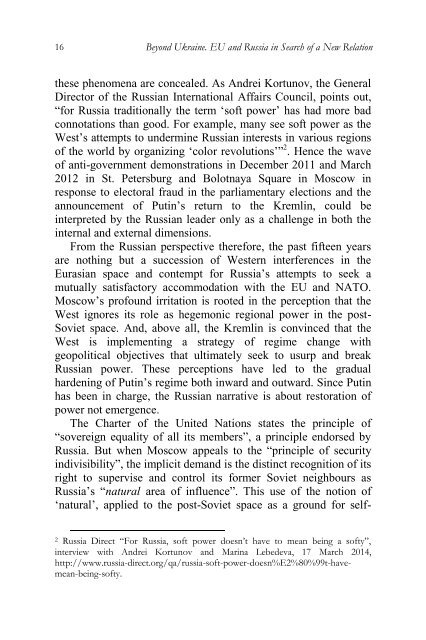beyondukraine.euandrussiainsearchofanewrelation
beyondukraine.euandrussiainsearchofanewrelation
beyondukraine.euandrussiainsearchofanewrelation
You also want an ePaper? Increase the reach of your titles
YUMPU automatically turns print PDFs into web optimized ePapers that Google loves.
16 Beyond Ukraine. EU and Russia in Search of a New Relation<br />
these phenomena are concealed. As Andrei Kortunov, the General<br />
Director of the Russian International Affairs Council, points out,<br />
“for Russia traditionally the term ‘soft power’ has had more bad<br />
connotations than good. For example, many see soft power as the<br />
West’s attempts to undermine Russian interests in various regions<br />
of the world by organizing ‘color revolutions’” 2 . Hence the wave<br />
of anti-government demonstrations in December 2011 and March<br />
2012 in St. Petersburg and Bolotnaya Square in Moscow in<br />
response to electoral fraud in the parliamentary elections and the<br />
announcement of Putin’s return to the Kremlin, could be<br />
interpreted by the Russian leader only as a challenge in both the<br />
internal and external dimensions.<br />
From the Russian perspective therefore, the past fifteen years<br />
are nothing but a succession of Western interferences in the<br />
Eurasian space and contempt for Russia’s attempts to seek a<br />
mutually satisfactory accommodation with the EU and NATO.<br />
Moscow’s profound irritation is rooted in the perception that the<br />
West ignores its role as hegemonic regional power in the post-<br />
Soviet space. And, above all, the Kremlin is convinced that the<br />
West is implementing a strategy of regime change with<br />
geopolitical objectives that ultimately seek to usurp and break<br />
Russian power. These perceptions have led to the gradual<br />
hardening of Putin’s regime both inward and outward. Since Putin<br />
has been in charge, the Russian narrative is about restoration of<br />
power not emergence.<br />
The Charter of the United Nations states the principle of<br />
“sovereign equality of all its members”, a principle endorsed by<br />
Russia. But when Moscow appeals to the “principle of security<br />
indivisibility”, the implicit demand is the distinct recognition of its<br />
right to supervise and control its former Soviet neighbours as<br />
Russia’s “natural area of influence”. This use of the notion of<br />
‘natural’, applied to the post-Soviet space as a ground for self-<br />
2 Russia Direct “For Russia, soft power doesn’t have to mean being a softy”,<br />
interview with Andrei Kortunov and Marina Lebedeva, 17 March 2014,<br />
http://www.russia-direct.org/qa/russia-soft-power-doesn%E2%80%99t-havemean-being-softy.


